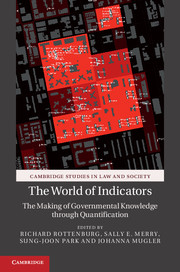Book contents
- Frontmatter
- Contents
- List of figures
- List of tables
- List of abbreviations
- List of contributors
- 1 A world of indicators: The making of governmental knowledge through quantification
- 2 The flight of the indicator
- 3 Narrating numbers
- 4 By their own account: (Quantitative) Accountability, Numerical Reflexivity and the National Prosecuting Authority in South Africa
- 5 Failure by the numbers? Settlement statistics as indicators of state performance in South African land restitution
- 6 Doing the transparent state: Open government data as performance indicators
- 7 Charting the road to eradication: Health facility data and malaria indicator generation in rural Tanzania
- 8 ‘Nobody is going to die’: An ethnography of hope, indicators and improvizations in HIV treatment programmes in Uganda
- 9 Financial indicators and the global financial crash
- 10 New global visions of microfinance: The construction of markets from indicators
- 11 Spirits of neoliberalism: ‘Competitiveness’ and ‘wellbeing’ indicators as rival orders of worth
- 12 Climate change vulnerability indicators: from noise to signal
- 13 Retroaction: how indicators feed back onto quantified actors
- Index
- Cambridge Studies in Law and Society
- References
5 - Failure by the numbers? Settlement statistics as indicators of state performance in South African land restitution
Published online by Cambridge University Press: 05 October 2015
- Frontmatter
- Contents
- List of figures
- List of tables
- List of abbreviations
- List of contributors
- 1 A world of indicators: The making of governmental knowledge through quantification
- 2 The flight of the indicator
- 3 Narrating numbers
- 4 By their own account: (Quantitative) Accountability, Numerical Reflexivity and the National Prosecuting Authority in South Africa
- 5 Failure by the numbers? Settlement statistics as indicators of state performance in South African land restitution
- 6 Doing the transparent state: Open government data as performance indicators
- 7 Charting the road to eradication: Health facility data and malaria indicator generation in rural Tanzania
- 8 ‘Nobody is going to die’: An ethnography of hope, indicators and improvizations in HIV treatment programmes in Uganda
- 9 Financial indicators and the global financial crash
- 10 New global visions of microfinance: The construction of markets from indicators
- 11 Spirits of neoliberalism: ‘Competitiveness’ and ‘wellbeing’ indicators as rival orders of worth
- 12 Climate change vulnerability indicators: from noise to signal
- 13 Retroaction: how indicators feed back onto quantified actors
- Index
- Cambridge Studies in Law and Society
- References
Summary
Government and public opinion have mainly measured the achievements of restitution quantitatively in terms of the number of claims settled and people who have benefitted, and the extent of land restored to claimants.
Ruth Hall (2010: 28)Introduction
On 30 March 2011, the South African Department of Rural Development and Land Reform presented its Draft Annual Performance Plan: 2011–2012 to the Parliamentary Portfolio Committee on Rural Development and Land Reform. When referring to its land restitution programme, the presentation indicated that the ‘purpose’ of this programme was to settle land restitution claims under the Restitution of Land Rights Act (Act No. 22 of 1994) and to provide settlement support to restitution beneficiaries, further highlighting as ‘key priorities’ the reduction of the backlog of land claims and the settlement of all outstanding land claims (Department of Rural Development and Land Reform 2011a: 29). The presentation then displayed a table containing its annual targets for backlog claims to be implemented, totalling 360 claims, as well as 90 new outstanding claims to be settled (Department of Rural Development and Land Reform 2011a: 30). The title of the table column containing these numbers read: ‘Performance indicator’.
Increasingly, we are living in a world informed by indicators. Indicators are statistical measures used to consolidate and standardize complex data into a simple number or rank that is meaningful to policy-makers, civil servants and the public (Merry 2011: S86). Thus constituting emerging technologies of knowledge quantification, indicators and their circulation support new forms of ‘evidence-based’ governance at the national, transnational and international levels (Davis, Kingsbury, and Merry 2010; Merry 2011). Embedded in epistemic environments that appeal to ‘new governance’ – a form of governance characterized by participation, flexibility, data-based monitoring and evaluation within an overarching ‘audit culture’ (Power 1997; Strathern 2000) – this recent upsurge of indicators is arguably based on a migration of basic technologies from corporate management and control into the realms of the state and civil society (Merry 2011: S90–S92). As a form of governance, indicators induce those subject to their measures to take responsibility for their own actions. They are meant to lead to forms of self-discipline and self-regulation that can be easily read and monitored from the outside, and as such, contribute to an increase in public accountability.
Information
- Type
- Chapter
- Information
- The World of IndicatorsThe Making of Governmental Knowledge through Quantification, pp. 102 - 126Publisher: Cambridge University PressPrint publication year: 2015
References
Accessibility standard: Unknown
Why this information is here
This section outlines the accessibility features of this content - including support for screen readers, full keyboard navigation and high-contrast display options. This may not be relevant for you.Accessibility Information
- 2
- Cited by
